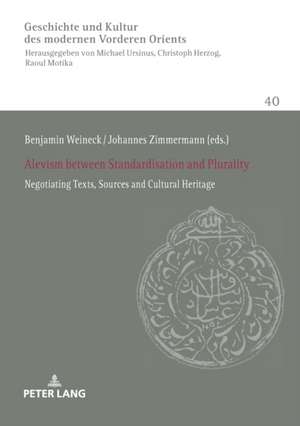Alevism between Standardisation and Plurality: History of Culture of the Modern Near and Middle East
en Limba Engleză Paperback – 17 ian 2019
Preț: 449.76 lei
Preț vechi: 584.09 lei
-23% Nou
Puncte Express: 675
Preț estimativ în valută:
86.10€ • 89.84$ • 72.18£
86.10€ • 89.84$ • 72.18£
Carte tipărită la comandă
Livrare economică 13-27 martie
Preluare comenzi: 021 569.72.76
Specificații
ISBN-13: 9783631663554
ISBN-10: 3631663552
Pagini: 282
Dimensiuni: 152 x 216 x 17 mm
Greutate: 0.41 kg
Editura: Peter Lang Copyright AG
Seria History of Culture of the Modern Near and Middle East
ISBN-10: 3631663552
Pagini: 282
Dimensiuni: 152 x 216 x 17 mm
Greutate: 0.41 kg
Editura: Peter Lang Copyright AG
Seria History of Culture of the Modern Near and Middle East
Notă biografică
Benjamin Weineck is Research Assistant in the Department of Religious Studies at the University of Bayreuth.
Johannes Zimmermann is Assistant Professor in the Department of Languages and Cultures of the Near East at Heidelberg University.
Johannes Zimmermann is Assistant Professor in the Department of Languages and Cultures of the Near East at Heidelberg University.
Cuprins
Literary Foundations of the Alevi Tradition - Defining Alevism via Written Texts - Alevi Cultural Heritage - Bektashi Hagiographies - Culture, Text and Identity amongst the Alevis - Between Debate and Sources - Religious Music in and from Dersim/Tunceli Today - Broadening and Homogenising the National Body - Approaching Alevi History beyond the Köprülü Paradigm
Descriere
The book analyses the ongoing struggle for a shared 'Alevi Cultural Heritage'. In these processes, the actors have to negotiate standardisation and plurality cutting across the manifold ethnic and socio-religious differences among Alevis.

